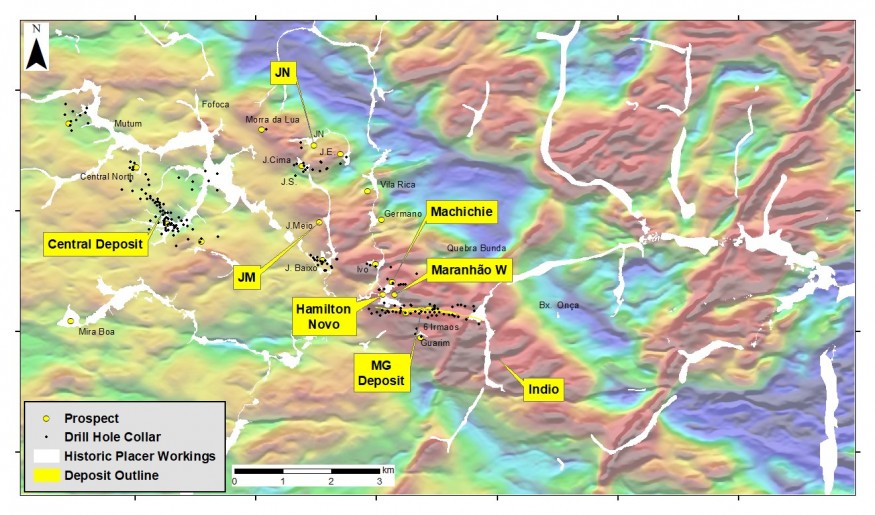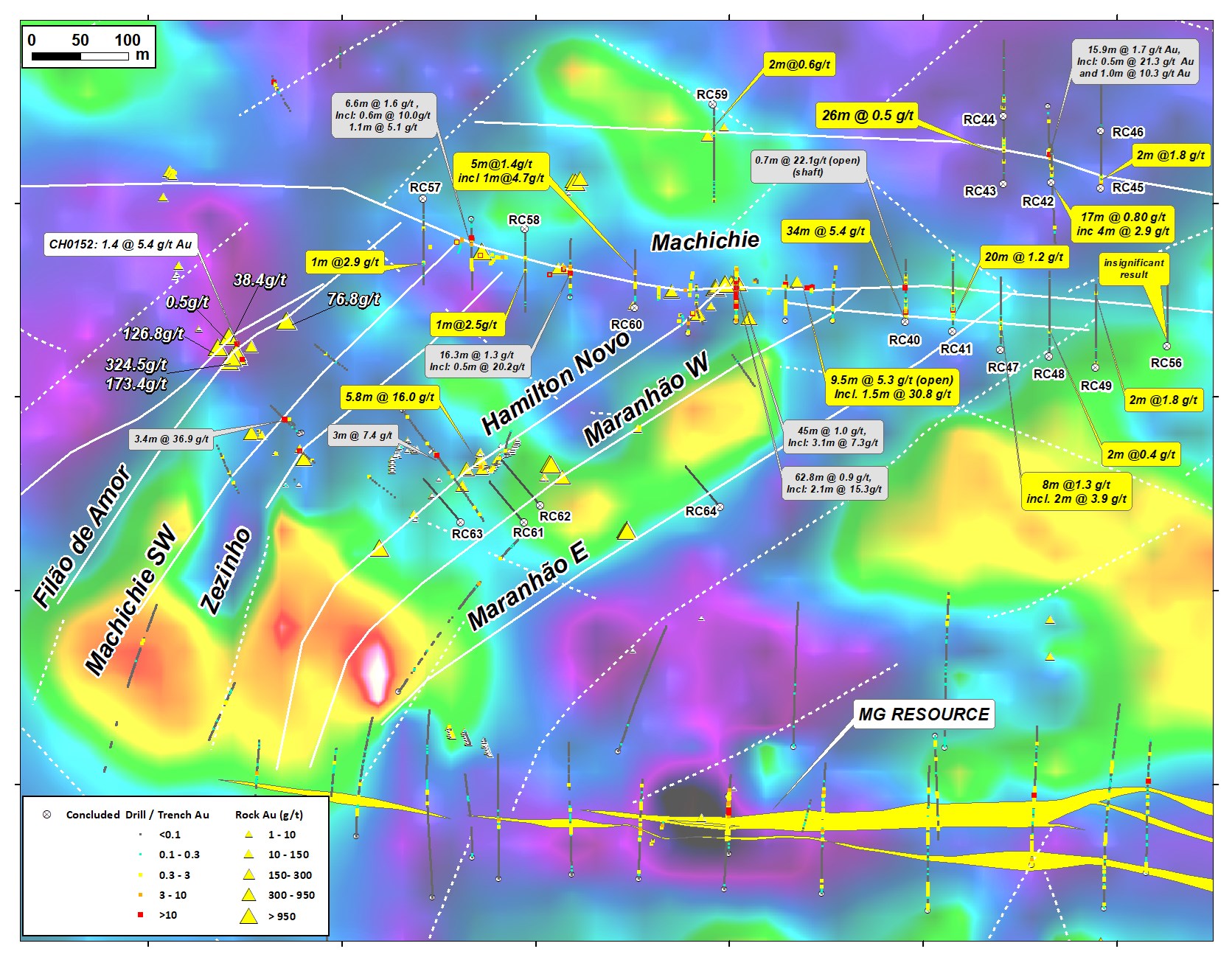Cabral Gold (CBR.V): Drills New Mineralized Vein at Indio and Continues to Expand Machichie Zone at the Cuiú Cuiú District, Brazil
Vancouver, British Columbia–(Newsfile Corp. – March 31, 2021) – Cabral Gold Inc. (TSXV: CBR) (OTC Pink: CBGZF) (“Cabral” or the “Company“) is pleased to provide initial assay results from reconnaissance RC drilling at the previously untested Indio target and assay results from follow-up RC drilling at the Machichie target within the Cuiú Cuiú gold district in northern Brazil.
Highlights are as follows;
- Assay results from five initial reconnaissance RC holes at the previously untested Indio target include 4m @ 2.5 g/t gold including 1m @ 8.7 g/t gold in hole 71. Hole RC72 intersected 5m @ 2.6 g/t gold including 2m @ 5.7 g/t gold. Initial drilling suggests the presence of a previously unknown high-grade vein which will require further drilling
- Additional RC drill assay results were returned from follow-up drilling at the Machichie target where recent drilling returned 34m @ 5.4 g/t gold. These include 8m @ 1.3 g/t gold including 2m @ 4.0 g/t gold from the eastern extension to the zone and 5m @ 1.4 g/t gold including 1m @ 4.7 g/t gold in the western part of the Machichie zone. In addition, assay results are pending on several holes from the Hamilton Novo and Maranhao West high-grade vein targets, located south of Machichie
- Reconnaissance RC drilling was recently completed at the JM target, and assay results are pending. Drilling is now in progress at the JN target where surface channel sampling returned 5.3m @ 24 g/t gold
- Infill diamond drilling is also in progress following up high-grade portions of the MG gold deposit and assay results are pending on several holes
Alan Carter, Cabral’s President and CEO commented, “The initial results from the previously untested Indio target are highly encouraging and suggest the presence of another high-grade mineralized structure at Cuiú Cuiú with continuity of high-grade. Further drilling will be required at Indio. At Machichie, additional follow-up drilling continues to expand the mineralized zone to the east and west and confirms the presence of a mineralized system that is very similar to the MG gold deposit located 500m to the south. We look forward to the results of recent and ongoing drilling at the high-grade portions of the MG deposit as well as the JM, JN, Hamilton Novo and Maranhao West targets”.
 Figure 1: Cuiú Cuiú location map showing the location of the MG and Central gold deposits, and the Machichie, JM (Jerimum do Meio), Hamilton Novo, Maranhao W and Indio targets. Background to map is 1VD RTP airborne magnetic data
Figure 1: Cuiú Cuiú location map showing the location of the MG and Central gold deposits, and the Machichie, JM (Jerimum do Meio), Hamilton Novo, Maranhao W and Indio targets. Background to map is 1VD RTP airborne magnetic data
Reconnaissance Drilling
Reconnaissance drilling using Cabral’s ASV ST-50 RC rig recommenced on 18th February 2021 on the previously untested Indio target (Figure 1). The rig has subsequently moved to test targets at JM and JN where mineralized veins are exposed at surface. At this stage, the company is completing several initial holes at each target and, if warranted, will return to each of the targets at a later date once the assay data is interpreted and compiled.
Indio Target
Six holes (RC54, RC55 and RC70 – RC73) were completed at the previously undrilled Indio target (Figure 2), which is located approximately 1.5km SE of the MG gold deposit. Whilst there is no outcropping vein on surface at Indio, grab samples of mineralized quartz vein float returned gold values ranging from 1.5 to 137.8 g/t gold.
The holes were drilled in two areas 150m apart (Figure 2). Unfortunately, none of the six RC holes at Indio reached the projected down-dip extension of the main mineralized target due to excessive water during the rainy season, which limited RC drill penetration depths. Nevertheless, several of the holes did encounter unexpected mineralized zones. Further drilling of this zone and the main target will be conducted during the dry season which commences in April.
Three holes (RC70 – RC72) were drilled in the SE area. RC71 returned 4m @ 2.45 g/t gold from 35m depth including 1m @ 8.7 g/t gold. Hole RC72 was drilled 40m SE of RC71 and intersected 5m @ 2.6 g/t gold from 36m including 2m @ 5.7 g/t gold (Figure 2).
Three holes (RC54, RC55 and RC73) were drilled in the NW area. RC54 returned 1m @ 1.8 g/t gold. Holes RC54 and RC73 returned only weak zones of mineralization.
 Figure 2: Map of Indio target showing location of drill holes and surface samples and interpreted mineralized structures
Figure 2: Map of Indio target showing location of drill holes and surface samples and interpreted mineralized structures
JM Target
Following the completion of the six reconnaissance holes at Indio, the rig moved to test the previously untested JM target (Figure 1), located 2.5km NW of the MG gold deposit and where recent surface channel sampling returned 0.9m @ 35.0 g/t gold and individual grab samples returned up to 700.2 g/t gold.
Six holes (RC74-RC79) have been completed at JM and assay results are pending.
JN Target
The reconnaissance RC rig has moved again and is currently drilling the previously untested JN target which is located 4km NW of the MG gold deposit (Figure 1) and upslope of reportedly the richest stream mined for placer gold on the property. Surface sampling and mapping at JN during late 2020 identified an outcropping vein trending NE. A channel sample taken at 90 degrees to the vein axis returned 5.3m @ 24.0 g/t gold.
Six initial reconnaissance holes are planned at JN.
Follow-up Drilling
Follow-up drilling is being undertaken with a larger contracted Prospector W750 RC drill rig at the main Machichie mineralized zone, as well as a number of new targets in the Machichie SW area.
Machichie Main Zone Drill Results
Results were returned on four additional step-out RC holes (RC47, RC48, RC49 and RC56) recently drilled on the eastern extension of the main E-W trending Machichie zone, and were designed as follow up holes to two initial step-out holes (RC40 and RC41) which recently returned highly encouraging results of 34m @ 5.4 g/t gold and 20m @ 1.2 g/t gold respectively.
The four new holes were drilled over approximately 200m strike length with the first step out hole (RC47) returning 8m @ 1.3 g/t gold from 43m depth including 2m @ 4.0 g/t gold. The next hole (RC48) returned only weak mineralization with a maximum of 2m @ 0.5 g/t gold from 51m and hole RC49 drilled further to the east returned 2m @ 1.8 g/t gold (Figure 3). The final and most easterly hole (RC56) failed to intersect any mineralization of interest.
Three additional RC holes (RC57, RC58 and RC60) were completed on the western part of the Machichie structure (Figure 3). Results include 5m @ 1.4 g/t gold from 71m depth including 1m @ 4.7 g/t gold in hole RC60. Hole 58 intersected 1m @ 2.5 g/t gold from 87m depth. Hole RC57, the western-most hole drilled to date at the Machichie target, intersected 1m @ 3.0 g/t gold from 132m depth.
 Figure 3: Airborne magnetic map (RTP 1VD) showing location of recent step-out drill holes at the Machichie target and the location of follow-up drill holes at the Hamilton Novo, Maranhao West and Machichie NE targets
Figure 3: Airborne magnetic map (RTP 1VD) showing location of recent step-out drill holes at the Machichie target and the location of follow-up drill holes at the Hamilton Novo, Maranhao West and Machichie NE targets
The drill results returned from the mineralized zone at Machichie zone suggest the presence of high-grade zones, or shoots, interspersed with zones of lower grade, which are very similar to the nearby MG deposit located 500m to the south. The higher-grade zones may be controlled by intersecting NE-trending structures and will require further drilling.
Machichie NE Drill Results
Results were returned on the final RC hole (RC46) at Machichie NE, which was drilled approximately 60m immediately north of RC-45 which intersected 28m @ 1.0 g/t gold from surface including 8m @ 3.3 g/t gold from 10m depth. RC46 was designed to test for parallel structures immediately to the north and failed to intersect any mineralization of interest.
The recent RC drill results from Machichie NE suggest the presence of another mineralized structure which is sub-parallel to the main Machichie structure. The mineralized zone remains open to both the east and the west and will require additional drilling to fully evaluate the extent of this new zone.
Hamilton Novo / Maranhao West
In addition, RC rig has completed three holes (RC61 – RC63) at the high-grade NE trending Hamilton Novo vein structure (Figure 3), which are designed to establish the continuity of high-grade gold mineralization intersected in a single previous hole which returned 3.0m @ 7.4 g/t gold. Surface channel samples in this part of the Hamilton Novo vein structure returned 5.8m @ 16.0 g/t gold. Assay results from the RC holes are pending.
The RC rig is currently testing another NE trending vein structure (Maranhao West), with hole RC64 located 75m SE of Hamilton Novo, where surface grab samples have returned gold values of 15.3 to 20.4 g/t gold. (Figure 3).
Infill Diamond Drilling
Infill diamond drilling program is in progress at the MG gold deposit and is targeting extensions of existing high-grade zones. Assay results are pending on six holes drilled to date.
About Cabral Gold Inc.
The Company is a junior resource company engaged in the identification, exploration and development of mineral properties, with a primary focus on gold properties located in Brazil. The Company has a 100% interest in the Cuiú Cuiú gold district located in the Tapajós Region, within the state of Pará in northern Brazil. Two gold deposits have so far been defined at Cuiú Cuiú and contain 43-101 compliant Indicated resources of 5.9Mt @ 0.90g/t (200,000 oz) and Inferred resources of 19.5Mt @ 1.24g/t (800,000 oz).
The Tapajós Gold Province is the site of the largest gold rush in Brazil’s history producing an estimated 30 to 50 million ounces of placer gold between 1978 and 1995. Cuiú Cuiú was the largest garimpo in the Tapajós and produced an estimated 2Moz of placer gold historically.
FOR FURTHER INFORMATION PLEASE CONTACT:
“Alan Carter”
President and Chief Executive Officer
Cabral Gold Inc.
Tel: 604.676.5660
Dr Adrian McArthur, B.Sc. Hons, PhD. FAusIMM., a consultant to the Company as well as a Qualified Person as defined by National Instrument 43-101, supervised the preparation of the technical information in this news release.
Neither the TSX Venture Exchange nor its Regulation Services Provider (as such term is defined in the policies of the TSX Venture Exchange) accepts responsibility for the adequacy or accuracy of this release.
Forward-looking Statements
This news release contains certain forward-looking information and forward-looking statements within the meaning of applicable securities legislation (collectively “forward-looking statements”). The use of the words “will”, “expected” and similar expressions are intended to identify forward-looking statements. These statements involve known and unknown risks, uncertainties and other factors that may cause actual results or events to differ materially from those anticipated in such forward-looking statements. Such forward-looking statements should not be unduly relied upon. This news release contains forward-looking statements and assumptions pertaining to the following: strategic plans and future operations, and results of exploration. Actual results achieved may vary from the information provided herein as a result of numerous known and unknown risks and uncertainties and other factors. The Company believes the expectations reflected in those forward-looking statements are reasonable, but no assurance can be given that these expectations will prove to be correct.
Notes
Gold assays have been determined by SGS method FAA505 (fire assay; 50 charge). Analytical quality is monitored by certified references and blanks. Until dispatch, samples are stored in the Company’s supervised exploration office. The samples are couriered to the assay laboratory using a commercial contractor. Pulps and rejects are returned to the Company and archived. The Indio Program has been conducted with Cabral’s ASV Scout ST-50, reverse-circulation drill rig equipped with two compressors and a booster. Samples were collected in 1 m intervals, and split through a Jones Riffle Splitter or cone and quartered if humid. The Machichie program executed by GEOSEDNA – Perfurações Especiais S/A. using a Foremost Prospector W750 reverse-circulation drill rig equipped with a compressor and booster, with samples split using a Metzke Riffle Splitter. Sampling through alteration zones is conducted in 1m intervals.



























